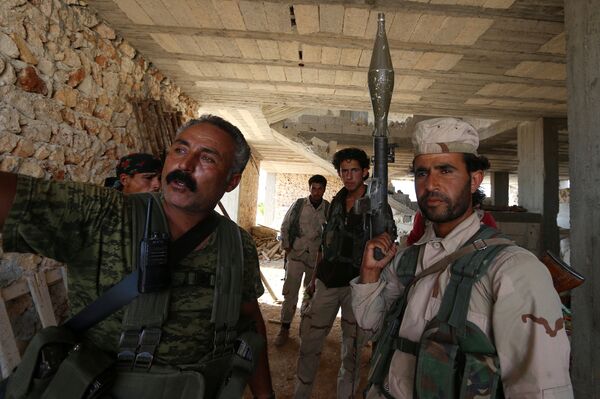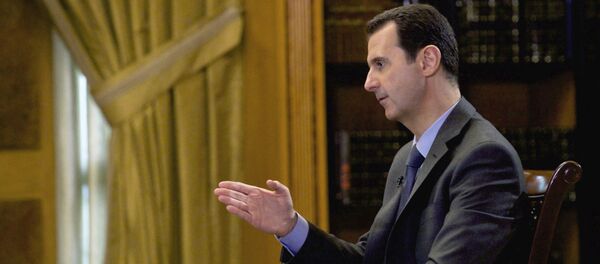The recent diplomatic memo by US State Department officials is by no means the "voice of dissent": there are all the earmarks that the initiative "had the blessing of the most senior officials in the department — including Secretary of State John Kerry himself," American historian and investigative journalist Gareth Porter writes in his article for the Middle East Eye.
"The memo called for a 'more militarily assertive US role' in the Syrian conflict in the form of 'a judicious use of stand-off and air weapons, which would undergird and drive a more focused and hard-nosed US-led diplomatic process.' That is precisely the policy option that Secretary of State John Kerry has been widely reported to have championed privately for years," Porter emphasizes.
But there is no reason to believe that the memo's author faced the threat of ostracism from the Obama administration for their views expressed in the document.
"The submission of the memo through the State Department's 'dissent channel' appears to have been a device to make it appear entirely independent of senior officials in the department," Porter stresses.
The memo includes phrases and sentences that sound "very much like an argument intended to be leaked to the media in order to dramatize the case for war against the Assad regime." They are "clearly calculated" to influence US public opinion in the first place, the journalist notes.

Remarkably, the leak of the memo coincided with the release of a report by Washington's influential think tank Center for New American Security, entitled "Defeating the Islamic State: A Bottom-Up Approach."
"In western Syria, a more radical shift is needed. Rather than focusing first on coming to a political agreement, the United States should emphasize arming and training local groups that are acceptable to the United States regardless of whether they are fighting Syrian President Bashar al-Assad or ISIS [Daesh]," the report reads.
As a result, the report notes, after moderate forces gain ground in the northwest and southwest of Syria, "a power-sharing agreement" should be struck by the US, Turkey, Saudi Arabia, Russia, Iran and the internal actors in which Assad's successor remains in control of "his" territory, while a variety of Syria's local religious and ethnic groups will "control and govern their territory."
So far, the report is calling to bolster the support to the Syrian "opposition" and to divide the country, de facto repeating major ideas of the Kerry-propelled Plan B.
Porter remarks that the Center for New American Security has certain ties to Democratic hopeful Hillary Clinton. Apparently, the report is a "roadmap" for Clinton's foreign policy in Syria, in the event of her replacing Obama in the Oval Office.
However, it seems that the aforementioned strategy is well underway.
"Under the proposal, which was personally approved by President Obama and heavily supported by Secretary of State John F. Kerry, the American and Russian militaries would cooperate at an unprecedented level, something the Russians have sought for a long time," Josh Rogin of the Washington Post writes.
In exchange, Washington wants Russia to pressure the Syrian government into halting air strikes against Islamists whom the US "does not consider terrorists." While Washington would not provide exact locations of these groups to Moscow, it would specify "geographic zones" that "would be safe" from aerial assaults from the Syrian Arab Army and its allies.
On the one hand, it is clear that Washington continues to persuade Moscow not to target anti-Assad Islamist groups such as Jaish al-Islam or Ahrar al-Sham, despite the fact they are consistently violating the ceasefire regime in Syria. These episodes are well-documented by the Russian Center for Reconciliation of Opposing Sides in Syria.
#SYRIA Report of the Russian Centre for reconciliation of opposing sides (June 30) https://t.co/p8ZUTGy2NJ pic.twitter.com/NnWK9VSUCw
— Минобороны России (@mod_russia) 30 июня 2016 г.
Furthermore, many of these groups have been spotted colluding with al-Qaeda's affiliate al-Nusra Front.
On the other hand, Washington is seemingly at pains to establish the much-discussed "buffer zones" or "safe zones" in Syria, which could be potentially carved out from Syria by "opposition groups," as Bangkok-based geopolitical analyst Tony Cartalucci has repeatedly warned.
At the same time, NATO has been deploying Patriot missile systems in Turkey under the pretext of a non-existent missile threat from Syria.
According to historian and retired US Army Maj. Todd Pierce, the deployment of Patriot anti-ballistic missile interceptor batteries to Turkey could be aimed at provoking a new crisis in the region.
"It is definitely not about protecting the Turkish people… It is directed at Russia in some way because there is no other potential opponent in the area," Pierce told Sputnik.
By hook or by crook Washington's foreign policy establishment is pursuing its geopolitical plan to topple Bashar al-Assad and split Syria up. Simultaneously, the White House is seemingly seeking public approval for bolstering US military actions in the region.




